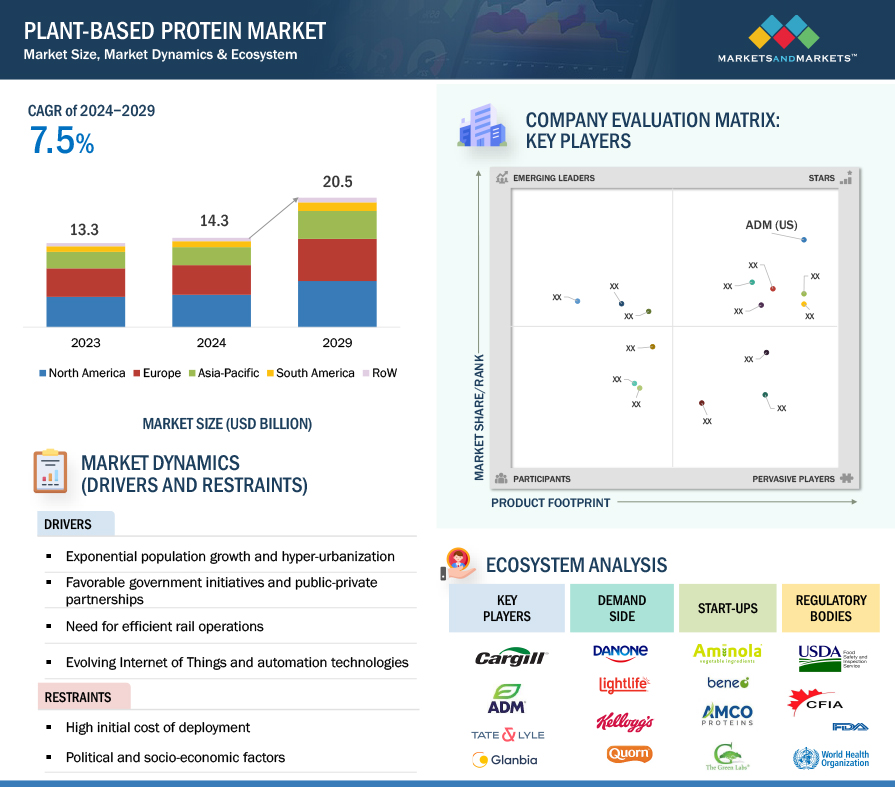The global plant-based protein market is expected to reach USD 14.3 billion in 2024 and is projected to grow at a CAGR of 7.5%, reaching USD 20.5 billion by 2029. Consumers are increasingly turning to alternative protein sources, favoring plant-based products over traditional animal-derived proteins. This shift is driven by several factors, including a growing interest in health-focused food and beverages, the rising popularity of veganism, the increasing prevalence of lactose intolerance, and the expanding consumption of alternative meat products. Additionally, advancements in technology for plant-based food solutions are contributing to the market’s growth. However, challenges remain, such as concerns about the taste and texture of plant-based proteins and the risk of allergies associated with certain sources.

North America is a major market for plant-based proteins, home to numerous leading players who are focused on strengthening their market position. These companies are investing in R&D and expanding their production capabilities to maintain a competitive edge in the industry.
Isolates segment expected to experience the highest CAGR growth during the forecast period.
Protein isolates are a highly refined form of protein powder known for their exceptional purity and high protein concentration, typically around 90%. Though more expensive than other plant-based protein options, they are favored for their excellent digestibility and versatility in a wide range of food products. Commonly sourced from legumes like soy and pea de-oiled cake, these isolates are considered one of the safest protein sources, even suitable for infant nutrition. The plant-based protein market foresees strong growth for isolates due to their concentrated protein content, making them ideal for use in nutritional and functional foods such as snacks, cereals, beverages, and plant-based meat alternatives.
Among these, pea protein isolates have gained particular attention, meeting the growing demand in the nutrition industry for high-protein options. As consumer interest and market opportunities expand, the demand for plant protein isolates, especially from peas, continues to rise. Manufacturers are responding by developing new isolates to capitalize on these opportunities. For example, in July 2023, Burcon NutraScience Corporation, a Canadian company, launched a hempseed protein isolate aimed at enhancing the nutritional profile of snacks and protein-rich food and beverage products. This strategic initiative reflects the increasing consumer demand for plant-based protein isolates.
Download PDF Brochure: https://www.marketsandmarkets.com/pdfdownloadNew.asp?id=14715651
Why is the demand for plant-based proteins in animal feed steadily increasing?
The demand for plant-based proteins in animal feed is on the rise, driven by increased consumption of animal products in developed regions. North America and Asia Pacific are key players in both meat production and feed usage. While plant-based proteins have long been a part of the food industry, they were traditionally processed in basic protein forms. Now, there is a growing shift toward more refined, high-quality protein-based feeds like isolates, signaling an improvement in feed quality. Pea protein isolates, particularly popular in aquafeed, and potato proteins, commonly used in compound premixes to boost yields, are becoming more prevalent. This move towards plant-based proteins in animal feed is fueled by a focus on sustainable agricultural practices aimed at reducing the environmental footprint of future food production.
The North American region is estimated to dominate the plant-based protein market share.
The growing interest in plant-based proteins in North America is driven by several factors that highlight shifting consumer preferences. These include heightened environmental awareness, increased health consciousness, and a growing recognition of the advantages of plant-based diets. Health-focused individuals in the region are increasingly choosing plant-based proteins over animal products, primarily due to their lower saturated fat and cholesterol content. Moreover, rising concerns about the environmental impacts of animal agriculture—such as deforestation, greenhouse gas emissions, and excessive water consumption—have led consumers to view plant-based proteins as a more sustainable and eco-friendly alternative.
Top Plant-based Protein Companies:
Key market players in this include Tate & Lyle PLC (London), Kerry Group PLC (Ireland), DSM Firmenich (Switzerland), ADM (US), Cargill Incorporated (US), International Flavors & Fragrances Inc. (US), Ingredion (US), Roquette Frères (France), Wilmar International Ltd. (Singapore), Glanbia plc (Ireland), Kerry Group PLC (Ireland), DSM-Firmenich (Switzerland), AGT Food and Ingredients (Canada), Burcon NutraScience Corporation (Canada), Emsland Group (Germany), PURIS (US), COSUCRA (Belgium), Tate & Lyle (UK).